
SeaLegacy uses advanced tech to broadcast the destruction of humanity's most vital resource from its 62-foot sailboat-and it's impossible to look away.
IT'S AN HOUR BEFORE DAWN, SOMEWHERE OFF THE COAST OF BAJA, MEXICO.
One of the eight residents of the SeaLegacy 1, a 62-foot sailboat, is beginning to stir from their bunk. It's hard to sleep in late-for one thing, the quarters are cramped. Once someone is up, everyone is up. But also, occupants of this vessel are in a race against time, and the sense of urgency in their work pulses louder than any alarm clock. Today, they're hoping to film fevers of mobula rays, or possibly pods of giant blue whales, or maybe orcas.
The SeaLegacy 1 is the office, home, and workshop of Paul Nicklen, 54, and Cristina Mittermeier, 58, life partners and two of the co-founders of SeaLegacy, a small organization of photographers and videographers documenting ocean destruction in real time. In theory, Nicklen and Mittermeier's job is simple: They publish images from their perch in the Pacific. In practice, Nicklen and Mittermeier also have to make people care. And they have to do it all from the sailboat's closet-turned-media room outfitted with one small desk for their MacBooks and a shelf of hard drives.
It's a setup that has only recently been made possible by digital leaps forward.
"It was just a few years ago that when you would dive with an IMAX camera, it weighed 500 pounds. It took two divers to operate it," Nicklen says. When the team hauled that camera back up to the boat, "You had to take that film and put it in cold storage, and then you had to fly it out immediately before humidity got to it." And then it couldn't be dealt with until the SeaLegacy team returned to their desktop computers at their home office in Canada.
この記事は Popular Mechanics US の September - October 2022 版に掲載されています。
7 日間の Magzter GOLD 無料トライアルを開始して、何千もの厳選されたプレミアム ストーリー、9,000 以上の雑誌や新聞にアクセスしてください。
すでに購読者です ? サインイン
この記事は Popular Mechanics US の September - October 2022 版に掲載されています。
7 日間の Magzter GOLD 無料トライアルを開始して、何千もの厳選されたプレミアム ストーリー、9,000 以上の雑誌や新聞にアクセスしてください。
すでに購読者です? サインイン
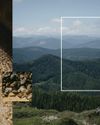
ONE OF THE 'GREATEST THREATS' TO THE PACIFIC NORTHWEST ISN'T WHAT YOU THINK.
EXPERTS ARE PREPARING THE REGION AGAINST THE THREAT OF DANGEROUS VOLCANIC MUDFLOWS, KNOWN AS LAHARS, WHICH COULD INUNDATE THE COMMUNITIES SURROUNDING MT. RAINIER IN AS LITTLE AS 30 MINUTES.
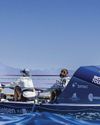
THE WORLD'S TOUGHEST ROW
They rowed 3,000 miles across the Atlantic, battling unpredictable weather, chaotic seas, and finicky equipment. But what they discovered gave them profound new insights into the power of the ocean.
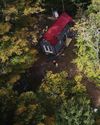
HOW TO DIY OFF-GRID SOLAR
SPEND THE TIME UP FRONT AND PLAN IT CAREFULLY TO AVOID DISAPPOINTMENT

Are We on the Verge of an ARMS RACE in SPACE?
RUMORS OF A RUSSIAN SPACE NUKE, ALONG WITH OTHER SATELLITE-TARGETING WEAPONS, HAVE MADE GEOPOLITICAL TENSIONS EXTEND INTO ORBIT.

Fresh Fingerprints on an Ancient Statue
A CLAY FIGURINE HAS SPENT MILLENNIA incomplete, waiting at the bottom of a lake for its long-dead craftsman to finish the Iron Age-era statuette.

Quantum Entanglement in Our Brains
IT HAS LONG BEEN ARGUED THAT THE human brain is similar to a computer. But in reality, that's selling the brain pretty short.

The Tools of Copernicus
WAY BACK IN 1508, WITH ONLY LIMited tools at his disposal, Nicolaus Copernicus developed a celestial model of a heliocentric planetary system, which he described in hist landmark work De revolutionibus orbium coelestium. It was a complete overhaul of our conception of the universe-one that, unfortunately, earned him the ire of the Catholic church for decades after his death-and forever changed the way we look at the stars.
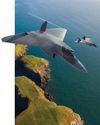
Building a Sixth-Generation Bomber Raptor
THE GLOBAL COMBAT AIR Programme (GCAP)-a project by the U.K., Italy, and Japan to develop a sixth-generation stealth fighter-has been busy at the drawing board reshaping its vision of the future of air warfare. And judging by the new concept model unveiled at this year's Farnborough air show, that future has big triangular wings.
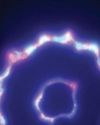
The Electroweak Force of the Early Universe
TODAY, THE UNIVERSE AS WE KNOW IT IS governed by four fundamental forces: the strong nuclear force, the weak nuclear force, electromagnetism, and gravity.

This Ancient Fossil With a Brain and Guts
WE KNOW WHAT FOSSILS LOOK like. For example, typical dinosaur fossils are bones turned to stone and preserved from the passage of time, located, if we're particularly lucky, in large collections that can be reassembled to represent the beast they used to prop up in their entirety.